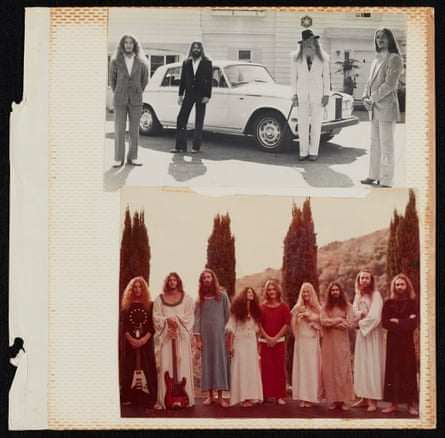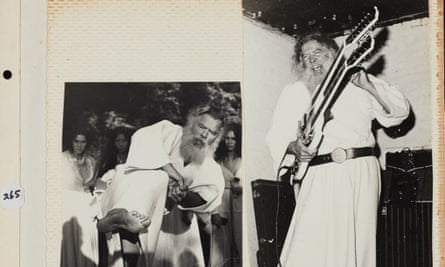Born in Ohio in 1922, James Edward Baker led a colourful life as an adult. He shot down 13 Japanese fighter planes in the second world war. He auditioned as Tarzan for a Hollywood movie. He killed a man using judo in 1955, and then killed another man in 1963 and was convicted of manslaughter. He had his hands legally registered as lethal weapons. He robbed anywhere between two and 11 banks. He became a successful restaurateur and a pioneer of vegetarian dining, with customers including John Lennon, Joni Mitchell and Marlon Brando. And in the early 70s he founded a utopian cult in the Hollywood Hills, reinventing himself as the supreme godhead Father Yod. Almost inevitably, in 1973 he started an extreme psychedelic rock band, Ya Ho Wha 13.
This month, the US label Sacred Bones releases a new compilation of highlights from the band’s archives alongside an intimate book, Family: The Source Family Scrapbook, in part to mark what would have been Father Yod’s 100th birthday. He died in 1975 in a hang-gliding accident after leaping off a 400-metre (1,300ft) cliff in Hawaii, despite having no prior air sports experience.

In the early 70s, Father Yod was thriving amid the hippy mania on the west coast. Financially secure owing to various exploits and investments, he had become a disciple of kundalini yoga in the late 60s before deciding to become a spiritual leader himself. His philosophy – inspired by the teachings of his former mentor Yogi Bhajan, and texts by Eugene Fersen and Jiddu Krishnamurti – blended eastern religion with western esotericism. He modelled his image on Michelangelo’s depiction of God the Father, bought a purple Rolls-Royce, and founded a commune based at a Georgian-style mansion in Los Feliz. There, he lived as the leader of up to 140 followers, smoked the “sacred herb” (marijuana) ritualistically, and engaged in tantric sex with young women, many of whom he subsequently took as his wives after police were alerted. (Years later, one of his ex-wives, Robin, called him a “dirty old man on a lust trip”.) This was the Source Family (AKA the Brotherhood of the Source), and as its members started to jam, Father Yod began to see music as a vessel for his teachings.
“It was music that enlightened him to go on his spiritual journey,” says Source Family archivist and documentarian Isis Aquarian, co-author of The Source Family Scrapbook and one of Father Yod’s 14 wives. She cites the Moody Blues and Jethro Tull as his main inspirations: music was an outlet to “connect with the younger people”, she says, the aim “to help promote spirituality and the betterment of all humanity for the planet”.

After the Family’s move to Nichols Canyon in 1973, Father Yod was given $30,000 by a Hungarian Holocaust survivor named Damascus – a rumoured mobster often referred to as the Godfather, according to Aquarian. The money was intended to start a new business: a healthy ice-cream parlour. But instead, Father Yod spent it on musical instruments and built a studio in the garage. (“Damascus was very upset,” says Aquarian.) There, Father Yod and the Spirit of 76 (later renamed Ya Ho Wha 13, following the decision to make all subsequent music purely improvisational) recorded about 60 albums’ worth of material, largely between the hours of three and six in the morning.
Sacred Bones’ new compilation captures the band’s untamed sound – at times, it evokes a crude mashup of Captain Beefheart and Canned Heat. There are genuinely decent singer-songwriter numbers by the more traditional Spirit of 76 band – the Dylan-esque honky tonk ballad A Lady – but Father Yod appears to be absent from these. When he is audible, it’s in the wild jams of the Ya Ho Wha 13 – built on ominous drum rolls (The Great Woe), invented words and growls (I’m Gonna Take You Home) and 10-minute freak-outs of space-age distortion (Ya Ho Wha).
They were rejected by every major label they approached, but self-pressed nine LPs, which they sold from the back of Father Yod’s wildly popular Sunset Strip vegetarian restaurant the Source. The band performed all over Los Angeles, from Venice Beach to Beverly Hills high school, but they struggled to secure much of a following. “I don’t think he was exactly what you would call a musician or even a singer,” says Aquarian. Despite what one impressively wild photo of him wailing on a double-necked Rickenbacker would suggest, Father Yod would mostly just bang a kettledrum or bash a metre-wide gong – and lead the chants alongside the band’s marathon performances. One newspaper review described them as seeming “out of place” at the famed rock venue Whisky a Go Go, and suggested they would be a better fit at Disneyland.
This music “wasn’t for that time”, says Aquarian. But today, the original LPs trade hands for thousands of pounds online. The Source Family Scrapbook co-author Jodi Wille – who also co-directed the 2012 feature documentary The Source Family – explains that a nascent appreciation had been brewing since the 80s; Sonic Youth’s Thurston Moore, actor-musician Vincent Gallo and superproducer Rick Rubin are fans. “The music is polarising,” she says. “Some people consider it unlistenable. But there’s also a primal, punk quality to it.”
Stay connected with us on social media platform for instant update click here to join our Twitter, & Facebook
We are now on Telegram. Click here to join our channel (@TechiUpdate) and stay updated with the latest Technology headlines.
For all the latest Music News Click Here
